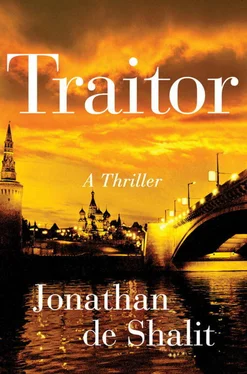Jonathan de Shalit
TRAITOR
ROME, 1983
The darkness fell out of nowhere. So blue and pristine just a few minutes earlier, the sky turned momentarily purple and then black, as if infused with ink. The warmth of the day, a pleasant enough one in early March, was replaced with a sudden chill. Shadows lengthened and darkened. Dim lights illuminated the street, while the beams of concealed floodlights washed over the walls. And in their glow, the magnificent structures took on the appearance of a grandiose backdrop for a play. The time was 6:02. A young man walked down the narrow street once more, tugging on his coat zipper, which was already pulled up as far as it could go anyway, and again passed by the iron gate of the American embassy. He was alone on the street, which appeared deserted for a moment. The noise of incessant traffic could be heard coming from the Via Veneto, the wide street that the splendid façade of the embassy, located in a building that had once served as a palace, overlooked. Whipped by the cold wind, its red and white stripes glowing in the beam of a spotlight, a large American flag flew at the top of a tall pole. To the young man, the huge building, with all of its windows sealed shut, looked empty and gloomy; but he knew its rooms were filled at that very moment with hundreds of people. He retraced his steps and firmly pressed the intercom buzzer on the gate. Two security cameras installed high above him rotated silently and focused on him.
“Yes,” came a metallic, nasal voice from the intercom speaker.
“I’d like to speak to someone from intelligence,” the young man said in fluent English, his voice steady.
“Consulate hours are ten to two,” the voice responded. “You can come back tomorrow.”
“I’d like to speak to someone from intelligence,” the young man repeated. “I don’t require consular services and I have no intention of returning tomorrow. I’m here on an important and urgent matter.”
“What’s your name and what brings you to the embassy?”
“The who and why are details I’ll reveal only to an intelligence representative.” The young man hesitated for a moment, and then added, “It’s a matter of national security.”
“Come in, please,” the voice instructed. A brief click was followed by the sound of a metal door swinging open. The young man walked in, and the door closed behind him. He found himself enclosed between high steel walls, the black sky visible above him. It was a small yard, measuring two by three meters. The Rome street disappeared behind the gate that locked behind him. Bright lights shone on him suddenly, and he closed his eyes for a second. “Welcome,” said the metallic voice that had addressed him moments earlier. “You’ll need to remove your jacket and raise your arms. We need a clear view of your hands. A security guard will be with you soon. You need to obey his instructions. Is that clear?”
“Perfectly clear.”
Dressed in a suit covered by a leather coat, the guard entered the compound through a door that opened in one of its walls and passed a metal detector over the young man’s body. He then slipped the metal detector into one of his coat pockets and frisked him along the length of his raised arms, over his back, and down his legs. “Come with me,” he said.
The young man followed the security guard into a structure that looked like a large glass aquarium. He was asked to remove his coat and take off his shoes, belt, and watch. He was then instructed to empty his pockets and pass through a large metal detector. “Where’s your passport?” one of the security guards asked. “I don’t see a passport here,” he continued, looking at the small pile of items the young man had removed from his pockets.
“I’ll show my passport only to an intelligence officer,” he said.
“You won’t be going any farther without a passport,” the guard replied in a brusque and stern tone. “You’ll be back on the street in no time.”
“I left it at the hotel, but I have a driver’s license in my wallet.”
The guard opened the wallet, pulled out two credit cards and a driver’s license, recorded the license particulars on a form he retrieved from a drawer under the counter, looked again at the credit cards, and returned them and the license to the wallet. He nodded to a second security guard, who then said: “Take your things and follow me.”
They entered the embassy building through a side door and walked down a long neon-lit corridor. There was no one else around, and their footsteps echoed down the passageway. “Wait here,” the security guard said after they entered a small, illuminated room, bare and devoid of any superfluous items. It contained nothing but a metal table, two chairs, a small refrigerator that reminded the young man of a hotel minibar, an image of a bald eagle embossed on the wall, and an American flag standing in the corner.
Dressed in a dark suit, his graying hair a little too long and somewhat unkempt, the man who entered the room looked fifty or so. He approached the young man, who half rose from his chair, shook his hand, and, with the young man still motioning to stand, said, “Sit, sit, please.
“My name is John Roberts, and I’m the deputy consul,” the man introduced himself, clearing his throat but only partially concealing the irony in his voice. He placed a writing pad on the desk straight in front of him. “And how may I help you?” he asked, his face lighting up all of a sudden.
“I asked to meet with an intelligence representative,” the young man responded, inhaling deeply like someone who was about to keep talking.
“This is an embassy, and we are all State Department officials,” Roberts said. “But I can assure you that whatever you have to say will be passed on to the very person who needs to hear it. Trust me, take it easy, and I’ll be able to assist you. We at the consular division handle such matters routinely and in a highly professional manner. Don’t worry. Would you like something to drink?”
“Cold water, mineral water if possible. Thank you.”
Roberts walked over to the small refrigerator in the corner of the room and retrieved a bottle of water and a plastic cup. “Look,” he said, “procedure requires us to begin with having you complete the following forms in the most detailed and comprehensive manner possible.” He opened one of the desk drawers and removed a pile of questionnaires printed on greenish paper. “I’d also like you to hand over all documents in your possession—passport, driving license, student card, whatever you have…” He retrieved several sheets of paper from the pile and placed them in front of the young man across the desk from him. “Fill them in. No need to hurry. We’ll speak afterward. I have time. You, too. Do a good job.” He sighed and leaned back in his chair.
The young man reached for the pile of forms, glanced over them, and, his voice suddenly hoarse, said: “May I have a pen, please?”
An hour and fifty minutes later, Roberts collected the forms. The young man sat back in his chair and took another sip from the cup of water. He was pale and appeared extremely tired—on the verge of exhaustion. Roberts lifted the telephone receiver by his side, dialed four numbers, and said: “Bring us a pot of coffee, please. Black, strong. Yes, now.” He flipped through the forms, which were now filled with tight, neat handwriting. Details upon details upon details. Names, addresses, phone numbers, names of parents, schools attended, beginning with elementary school, academic studies, places of employment, military service, acquaintances, hobbies, favorite books, membership in organizations, social activities, overseas travel, relatives and friends, particulars, names, dates. “Okay…,” he said, placing the forms on the desk, opening the top button of his shirt, loosening his tie, and then hesitating for a moment while glancing at the papers in front of him. “Okay, Alon, let’s start talking.”
Читать дальше













